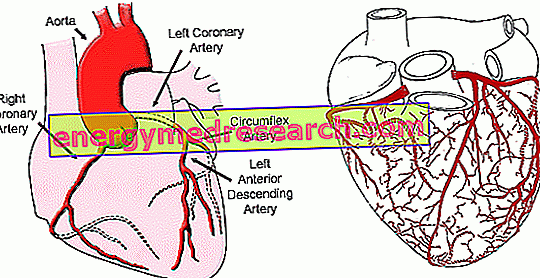By Dr. Francesca Fanolla
In the millennium in which the macrobiotic cuisine and the organic rice cakes reign supreme, replacing the now outdated sandwiches with ham, it is not at all difficult to notice - especially in environments where body care and well-being become the main objective (gyms, wellness centers, beauty centers, etc. ..) - a particular category of people that cannot be defined as either anorexic or bulimic.

The term Orthorexia derives from the Greek ' orthos ' (healthy, correct) and ' orexis ' (hunger, appetite); was coined in 1997 by British nutritionist physician Steven Bratman, who first diagnosed this particular eating disorder right on himself. He became aware of some of his extreme behaviors related to nutrition which, due to their repetitiveness and abnormal rigidity, resulted in something definitely pathological. Currently this disorder is not yet recognized as a psychiatric (food) pathology, as are anorexia and bulimia, so it is not included in the DSM (diagnostic and static manual of mental disorders).
However, the now evident frequency of subjects united by eating behaviors "unregulated in the excessive rule", makes this phenomenon one of the diseases that best represent the social discomfort of the spasmodic search for physical perfection, or of general hypochondria towards all that can be 'contaminated' with any component that is not considered 'natural' or 'good'.
But who is the ortoressico? Very simple: he who is literally obsessed by the chemical-biological composition of food, as well as by the caloric component in terms of fat and sugar in particular, who loses hours in supermarkets spasmodically comparing product labels in desperate search of the most dietetic or healthier one ', the one who deprives himself without remorse, but rather with great gratification for his own' consistency ', of dinners and outings with friends, even of the classic Sunday pizza or the best friend's birthday party, terrified by the possibility of having to eat something that does not fit into your impeccable eating style. The topic that is most dear to the orthorheic, the one that gives the input to the actual pathological behavior, concerns, in addition to the caloric intake, the supposed harmfulness of adjuvant products in agriculture (pesticides, etc.), the alleged toxicity of metal alloys used in the production of cookware and canned food, the abuse of plastic materials in food storage, the potential danger of microwave ovens, and organoleptic damage to the same foods caused by freezing or certain types of cooking.
Personally, I often chat with people who are definitely orthorexic, especially in the gym, where, in fact, the perfection of nutrition goes hand in hand with the obsession with training and the phenomenon of bigorexia (already described in another article of mine).
I believe that the ancient Latin phrase ' In medio stat virtus ' also holds great value in the alimentary field, where unfortunately, both due to ignorance and superficiality and laziness, wrong information is undermined or received incorrectly and at one's convenience.
The strangest and really shocking thing is the paradox of some situations in which I frequently come across, such as that of an inveterate smoker who fills with antioxidant supplements or organic and absolutely healthy foods, with the illusion of finding in them an elixir of long life, or those who, punctually, play in rivers of alcohol every weekend but daily chew only green vegetable leaves or fruit and vegetables because they are in harmony with a 'healthy' lifestyle ...
Inconsistency and incongruity aside, it is the social aspect, in addition to the physical aspect, that is worrying, since it has always been a festive dinner table for a particular event, be it a wedding, Christmas or the simple year-end dinner with colleagues, represents an opportunity to be together, to discuss, to relate. In short, food and 'eating' have always represented a very important factor of cohesion and social participation. A factor that is categorically excluded and cut off from orthorhexics, which would never compromise in order not to break its food rule.

As with anorexia, everything starts in a natural, apparently right way, that is, of wanting to control nutrition in order to prevent chronic diseases, or lose weight or simply improve the general state of health, or even to help a training program which aims at the construction of a body in shape, whether it is the hypertrophic bodybuilder or the toned but harmonious and dry body of a dancer. The substantial difference between orthorexia, bulimia and anorexia is that the attention, in the first, is directed exclusively to the quality of the food, rather than to the quantity, as it happens for the other two pathologies mentioned.
The passage from the correct and healthy diet to the pathology of a purely psychological nature, alas, is often very short. Extreme and very dangerous cases occur especially when it comes to developing adolescents, who need more than ever food 'foundations' for bone calcification, muscle building, metabolic adjustment, etc ... or, worse still, when it comes to pregnant women who are depriving themselves of food essential for the nourishment and health of the unborn child and who then refuse to breastfeed or give the baby milk powder, because they are convinced that there are potentially chemical principles in them harmful.
Unfortunately, this too, in my opinion worrying, is often confused with fortitude in following the chosen lifestyle, because this is what it is, since the food style inevitably ends up joining the social life of the individual .
I consider it necessary that each of us, with regard to the phenomenon of orthorexia - but also to others of more common frequency, such as obesity, cholesterol, anorexia, bulimia, cardiovascular diseases, diabetes etc ... - should inquire about very simple but fundamental rules for the correct diet, which as we all know is the basis of well-being. It is not difficult at all, let alone a peculiarity of graduates or experts in the field, given the vastness of articles, texts, magazines and websites available for anyone who wants to know what to eat and how to eat, to devote to their care even just 10 minutes day in reading or in good information.
Attention, prevention and, why not, consistency and rigidity in following a food style are extremely useful, as long as it is 'really' healthy and correct, after medical information and consultation and even if the individual is not debilitated in the same well-being to which he so desires, both in the social life of which he does and must be a part to consider himself, for all intents and purposes, a healthy person.



